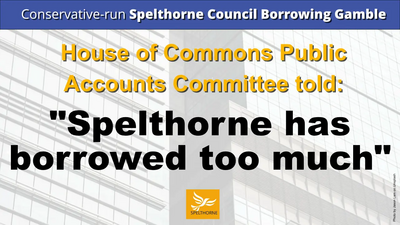Spelthorne has borrowed too much

It doesn't make sense
Mr Robin Whiteman, the Chief Executive of the Chartered Institute of Public Finance Accountancy (CIPFA). has told the House of Commons Public Accounts Committee (PAC) that Spelthorne "has borrowed too much".
In a public hearing held on 11th May, Rob Whiteman was absolutely clear that in his opinion Spelthorne's borrowing was not appropriate in terms of the risk or the level of borrowing. The full hearing can be watched on the Parliamentary website and a transcript of the hearing can be read here.
Local Liberal Democrats have asked many questions about both the borrowing of the Council and the processes for assessment of investments. Key issues that have been raised have been:
- The poor quality of the documentation to support investment decisions.
- Lack of proper consideration of financial risks.
- Optimism bias in decision making.
- Excessive reliance on a small number of external consultants.
- The lack of reporting and scrutiny of the Council's decisions and portfolio performance.
Liberal Democrat Finance spokesman, Cllr Lawrence Nichols said "I am very pleased to see that the PAC is taking an interest in this type of borrowing by Spelthorne and other Councils. I have tried to raise these issues with the Leader and Cabinet but they have previously chosen to ignore any challenge and bury their collective heads in the sand. I hope that the final report of the PAC will make them sit up and listen at last."
A round-up of some of the key moments during the hearing:
The hearing started with evidence on the financial impact of the Covid-19 epidemic on local authority finances. The PAC then went on to consider LA borrowings in the light of the recent National Audit Office report on the subject.
During the hearing (@15:49 in the video) Rob Whiteman said:
"Spelthorne borrowed too much-with a £10 million* turnover a year, it borrowed £1billion for commercial investment. You do not have to be accountant of the year to know that that is quite a lot of excessive leverage and commercial risk.
The majority of councils-if you look at the NAO Report, 49 councils accounted for 80% of the £6.6 billion. Taking out Spelthorne, that is less than £100 million for those 49 councils. Bearing in mind the size of their operations, as Councillor Watts says, that doesn't sound particularly excessive-and not in the Spelthorne league-but councils should not take on debt for yield that they can't afford if things go wrong. As covid-19 shows, we do have a rainy day at times and therefore overall prudential financial management with debt being an appropriate part of your budget that you can pay back if the markets alter is very important."
* Corrected to £23m later in the hearing
A Conservative MP, Chris MacKinley, questioned the competence of Councils to make decisions of this type on this scale. He said (@16:05):
"Very finally, on the Spelthorne experience, there was nearly a billion pounds-worth of borrowing. You said it had income of £10 million; I have just looked at the paper that it gives its residents, and it's about £23 million if you strip out the investment income. Its borrowing was 44 times its income. For Woking, it was 26 times. If you are a person with £50,000-worth of income, where on earth could you sensibly and sustainably have £2.2 million-worth of borrowings? That is effectively what Spelthorne has done. It doesn't make sense.
Rob Whiteman: I agree, actually, that public bodies should not have greater commercial freedoms than the commercial sector and that actually, in the private sector, an organisation the size of Spelthorne would not have been able to attract that amount of leveraging and borrowing. So I actually agree with the point. We must remain public bodies rather than becoming property development vehicles with an ancillary local authority function, so I agree with the question.
The strength of elected members is that they are lay members acting on behalf of the public, rather than being experts, but that they do get good advice. That is why I think that, actually, not only taking officers' advice but making sure that, as a requirement, there is also external advice, independent advice, and that there is strong local audit to make sure that governance is operating in that way is all very important to avoid the fears that you have that things can get railroaded through very quickly."
Spelthorne Liberal Democrats made our own submission to the PAC which will be made public when the final report is published. This submission highlighted our concerns about the way that the borrowing has been done in secret without proper scrutiny. We also raised our concerns about the monitoring, reporting and ongoing scrutiny of the commercial investments. All the issues have been raised previously within the Council, with most being ignored by the ruling Conservative Group without giving any cogent responses.
In December Spelthorne Liberal Democrats made a submission to the Redmond Review "into the arrangements in place to support the transparency and quality of local authority financial reporting and external audit in England". We put forward our view that the accounts were not sufficiently easy to understand and not transparent. We raised concerns about the way the accounts failed to separate the commercial activities from the service provision aspects of the Council's activities.
